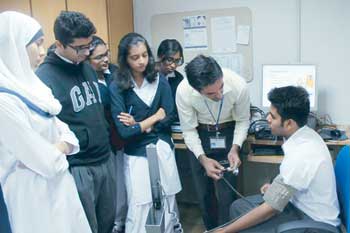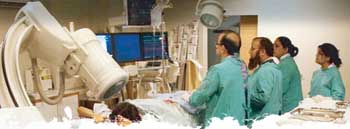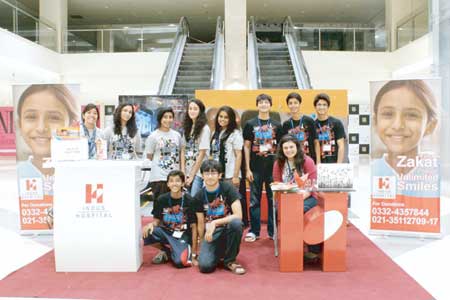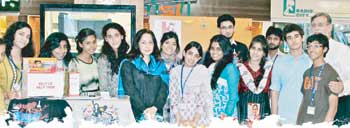A visionary par excellence
It was back in 1986 when Karachi was hit by a bomb blast that the city faced the first emergency of its kind, causing Civil Hospital, Karachi, to be inundated with the injured in critical condition and on the brink of death. The hospital was unable to cope with the victims bought in, causing many doctors and hospital staff much distress. This event pushed health industry professionals to band together and establish the Patients Welfare Association (PWA), a first in philanthropy in the health sector.
After nearly a decade of working with PWA, a small group of doctors realized that this was not enough. There were still scores of people who were in dire need of free treatment for various diseases and there was very little they were being able to do at the government facility. This opened a new chapter in their lives and in 2005, the group of doctors laid the foundation of Pakistan’s first free general hospital.
They unanimously pledged their support to make a difference to the healthcare situation in Pakistan, and as their efforts came to fruition, The Indus Hospital officially began operations in the year 2007. It was the country’s first paperless and 100 percent cashless, state-of-the-art, tertiary hospital.
Us recently got in touch with Dr. Abdul Bari Khan, CEO and co-founder of The Indus Hospital, and got to learn more about his efforts for humanity. Dr. Abdul Bari Khan is a renowned cardiologist and a proud recipient of Sitara-e-Imtiaz for his unwavering services to humanity in the form of The Indus Hospital. Let’s read about his firm belief that nurtured a thought into an idea and led it to become a soaring reality.
Us: What are the core values on which The Indus Hospital stands?
Dr. Abdul Bari Khan: We established The Indus Hospital for the sole purpose of serving humanity so that Allah SubhanahuWaTa’ala is pleased by our efforts. We believe that it is our responsibility to provide excellent healthcare as the basic human right, irrespective of caste, colour or creed. There are no cash counters in the entire hospitals so that the patients are treated without crushing their pride or dignity. We encourage people who have similar passion to join us and our cause and contribute their share in changing lives of less privileged people of our country. After all, if the Almighty has given us more than others, it is our responsibility to share what we have with others.
Us: What are the strengths of your hospital and what are your weaknesses?
Dr. ABK: Some of the strengths of The Indus Hospital are: it is Pakistan’s first paperless hospital. It is the first tertiary care multi-disciplinary hospital that provides absolutely free of cost services to all patients. The Indus Hospital has grown to form a health network with hospitals in Karachi, Badin, Lahore, Muzzafargarh, Bhong and district Rahim Yar Khan. So far, services worth of US $50 million have been rendered and it’s increasing every day. National and International collaborations with organizations like UNICEF, WHO, The Health Foundation, University of IOWA, Chal Foundation and IBA are helping us serve humanity.
The weaknesses are: the heavy influx of patients every day due to which many of the patients have to wait in long lines. We are working on this by expanding the hospital and we are optimistic that the expansion of the hospital will help address this weakness. Currently, the hospital has 150 beds, which are inadequate for the 40,000 plus patients that visit us every month. Keeping this in mind, we are expanding our capacity to more than 1800 beds so that we don’t have to turn down people merely due to lack of space. This is a long process and will take a decade but we have divided it into phases.
Another weakness is the lack of human resources available to the Indus Hospital. Many professionals come and join us but leave as soon as they find good opportunities outside the country, especially the doctors. This is mostly due to the attractive economic opportunities available to the doctors outside Pakistan. On the other hand, there are professionals who join us but need extensive training in order to get aligned with the vision of The Indus Hospital. This often becomes a tedious process, too.
Us: From 150 to 1800 plus beds, how do you think you will manage that?
Dr. ABK: We have a firm belief in Allah and that is why we are sure we will manage it very well. We don’t have the slightest doubt in our hearts and mind that the expansion plan will not be managed. We believe it will become one of the prime models of the country in the times to come and others will follow it too.
Us: How much work of expansion has been already done?
Dr. ABK: The first phase of the expansion plan has started and the ground work has begun. After the completion of this phase, the hospital will transform from 150 beds to 996 beds. The ground breaking started back in 2014 and it will be completed in 2018. The entire expansion of the hospital will be done by 2024. This will increase the capacity of The Indus Hospital, Korangi, Karachi to 1800 plus beds.
Us: You have some smaller campuses, too, besides your Korangi hospital. Tell us something about that.
Dr. ABK: After visiting and observing what we do at The Indus Hospital, some people donated their buildings or small scale hospitals to us, so we now have our sister concerns in various parts of Sindh and the Punjab. These are Sheikh Saeed Hospital, Korangi, Al Fakir Trust at PIB, Child Cancer Foundation Hospital at Ayesha Manzil and Civil Hospital Badin in Sindh while Recep Tayip Erdogan Hospital in Muzaffargarh, Muhammad Shahbaz Sharif Hospital in Lahore, and Al Ghazi Hospital at Bhong are our projects in Punjab.
Us: Do you have all basic medical facilities in your hospital?
Dr. ABK: Yes, we have everything from cardiology to orthopedics and from hemodialysis to endoscopy. We have family medicine, ophthalmology and lithotripsy. We even have treatment for clubfoot. Besides, we have a Ghori TB & MDR-TB Clinic, which is a purpose built building outside the main hospital, but is in the same vicinity. This building contains the clinics, a research office, medicine store, ration distribution store and public toilets. Removed from the building and waiting areas, the sputum collection booth is tucked away in a private corner of the site.
Along with this, we are also proud to have introduced Pakistan’s first centralized blood centre - The Indus Hospital Blood Centre that provides quality screened blood to hospitals across the city.
What we don’t have right now is psychiatry and adult oncology at our facility.
Us: You didn’t have gynaecology as well. Is it now available? And any plans of introducing the other two mentioned above?
Dr. ABK: Yes, we do not have gynaecology at our Korangi building but The Indus Hospital Sheikh Saeed Campus in Karachi offers comprehensive gynaecology and obstetrics services now. The departments of Adult Oncology and Neurosciences and Psychiatry will be added during the expansion of the hospital. While the children oncology treatment is rendered at Children Cancer Foundation in Karachi.
Us: The only complaint we hear about the hospital is long waiting hours. Will the situation become better?
Dr. ABK: Yes, this is an issue but as already mentioned this will be addressed to a great extent through the expansion plan. Since the hospital is free of cost, the inflow of patients is very high. However, we are doing our best to address this issue through expanding the capacity of the hospital. We also prefer that the emergency patients should not wait; hence, if we are unable to help them we refer them to other hospitals. We realize the importance of time for an emergency patient so we often use our ambulances or transport to help them reach some other hospital in time. If need be, we speak to the staff there and try to help our patients in every possible manner.
Us: You mentioned earlier the lack of quality human resource. Is this the reason you plan to start your own medical university too?
Dr. ABK: Exactly! We believe if there is a problem then we should come up with solutions, too. There is no point fretting about issues without suggesting solutions. The purpose of this university is to breed our own human resource. We want to train our professionals from a very young age, and aim to align them to the vision of The Indus Hospital, so that they are able to work with the same passion from day one. Also, this university would help us train our doctors and medical professionals according to the qualities we require at the hospital. We plan to train the medical professionals with excellence, so that they are not only employed at our facility, but will be sought out by hospitals from all over the country. Quality would be our main focus.
Us: Will the university admit students free of cost as well or there will be very low charges for their studies?
Dr. ABK: This would not be free for all but we will evaluate and give need based scholarships. The student fee for the university will be very low so that we can accommodate as many deserving youngsters as we can.
Us: Tell us something about your school of nursing?
Dr. ABK: The school of nursing is a part of The Indus Hospital. Nurses are trained here and after completion of their course they often get placed at The Indus Hospital. A lot of them join other hospitals, but most of our nurses prefer to serve at the Indus Hospital.
Us: Do you have any programmes for the youth at The Indus Hospital, teaching them about the importance of philanthropy?
DR. ABK: We usually have our volunteer programmes during Ramazan when we need them the most. Our volunteer programme serves to provide a great lesson to all the volunteers who are working at The Indus Hospital. We welcome volunteers and interns to contribute their precious time and efforts and enable us to change lives. Whether you are a student, housewife, self-employed, retired or freelancing, if you want to spend quality time, and if you have the passion to serve, we encourage you to be a part of us. There is no better feeling than to see someone smile and to know that you are the reason behind it.
These volunteers work in several departments including Marketing, Communication and Donor Relations. They also get to spend time with patients in wards. This inculcates in them empathy and compassion. If they are medical students and are interested to learn how hospitals’ administrations work, then we rotate them to administration where they get the real feel and flavour of the hospital environment. Of course, they won’t be able to treat patients on their own, but they help the doctors in cleaning wounds or managing slight emergency cases.
Working in various departments of The Indus Hospital makes them count their blessings. They feel the pain of the common man and become thankful for all the blessings they have. It instils the feelings of philanthropy in them.
Us: How can we motivate young people to contribute towards The Indus Hospital?
Dr. ABK: Youngsters are the soul of the nation. They are the future and a lot depends on them. Youngsters can contribute in a lot of capacities. Small efforts of the youth go a long way for us at The Indus Hospital, donating a small sum of money from their pocket money or coming and spending some time with the patients and contributing with their time towards the operational departments of the Indus Hospital are of great significance to us. My message to the youth would be to play their part in becoming conscientious citizens of Pakistan by investing your time, energy and resources for those who are not as fortunate as you are.